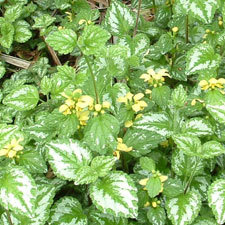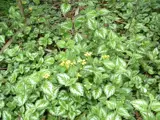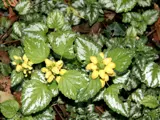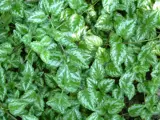 Aluminium plant
Aluminium plant
Common name: Aluminium or Artillery plant
Botanical name: Lamium galeobdolon ‘Variegatum’
Management programme: Advisory
Originates from Europe and Western Asia. Introduced to New Zealand as an ornamental garden plant for ground cover and thought to have naturalised in 1988.
Why is it a pest?
- Aluminium plant grows rapidly to cover large areas of ground with a thick mat that stops seedlings of other plants from establishing.
- It is shade tolerant so can invade and be an issue deep into the bush as well as along margins.
- Aluminium plant can be spread by vegetative fragments dumped with garden waste or through deliberate plantings.
Where is it found?
- It is often found in gardens growing in the cooler areas around trees and shrubs.
- Aluminium plant is found throughout the Bay of Plenty.
What does it look like?
- Aluminium plant is a pleasant smelling, erect, mat-forming ground cover up to 50cm tall.
- The leaves are hairy, pointed, coarsely toothed, and mint-like, in opposite pairs, with silvery-grey patches on the upper surface.
- Stems are purplish, square and densely hairy on the angles.
- From December to May tubular, hairy, lemon yellow flowers (20-25 mm long) are produced in dense axillary whorls, but no seed is set.
What are the rules?
Advisory
The Bay of Plenty Regional Council does not enforce the control of advisory species. It is landowner/occupier responsibility to manage these pests. Council may provide advice on how to manage or control these species if required.
How do you get rid of it?
Recommended:
- Dig out small patches.
- Spray with metsulfuron-methyl (year round).
Follow up treatment will be required every three months until there is no regeneration.
CAUTION: When using any herbicide or pesticide, PLEASE READ THE LABEL THOROUGHLY to ensure that all instructions and directions for the purchase, use and storage of the product, are followed and adhered to.
Read more on pest control advice, information and regulations
Images






